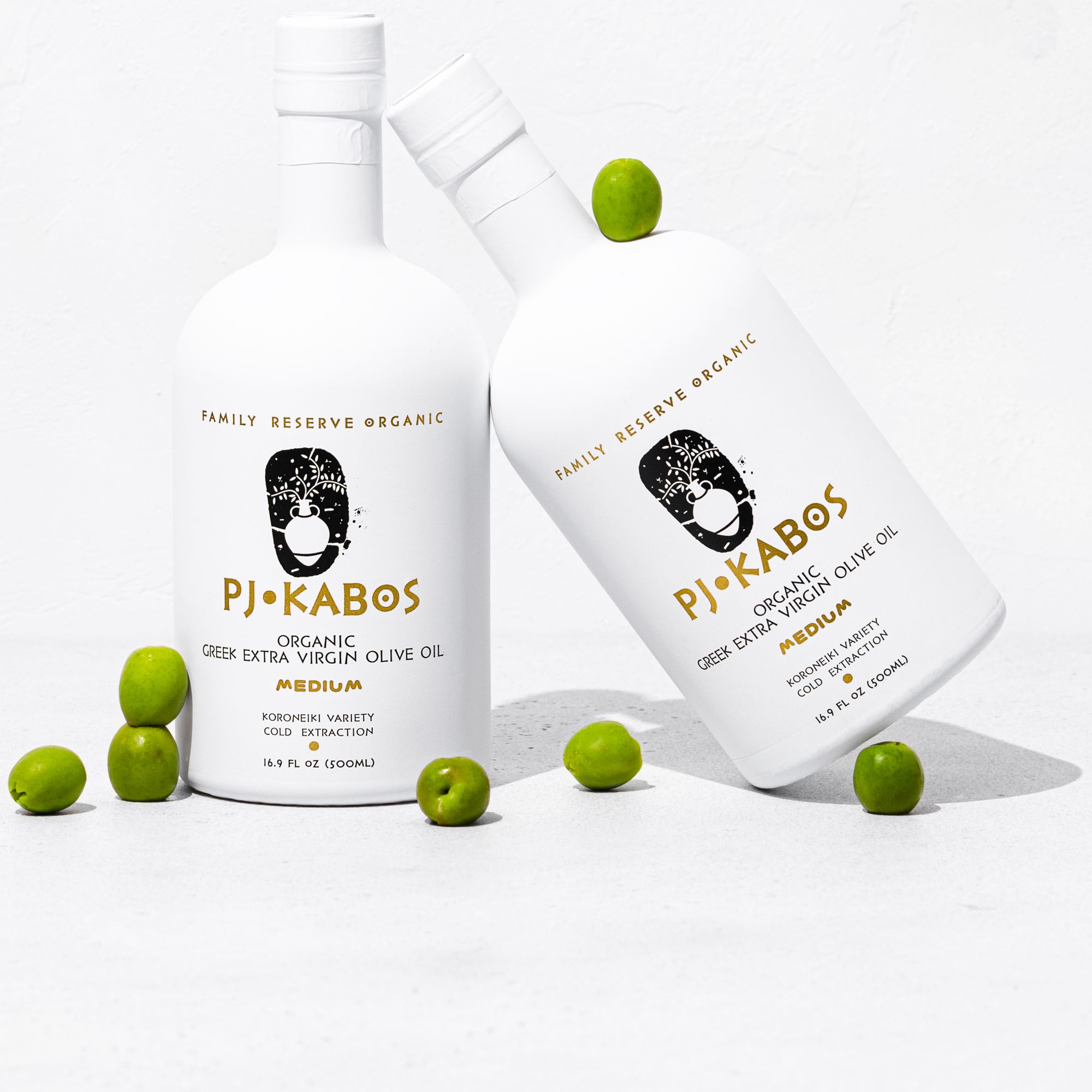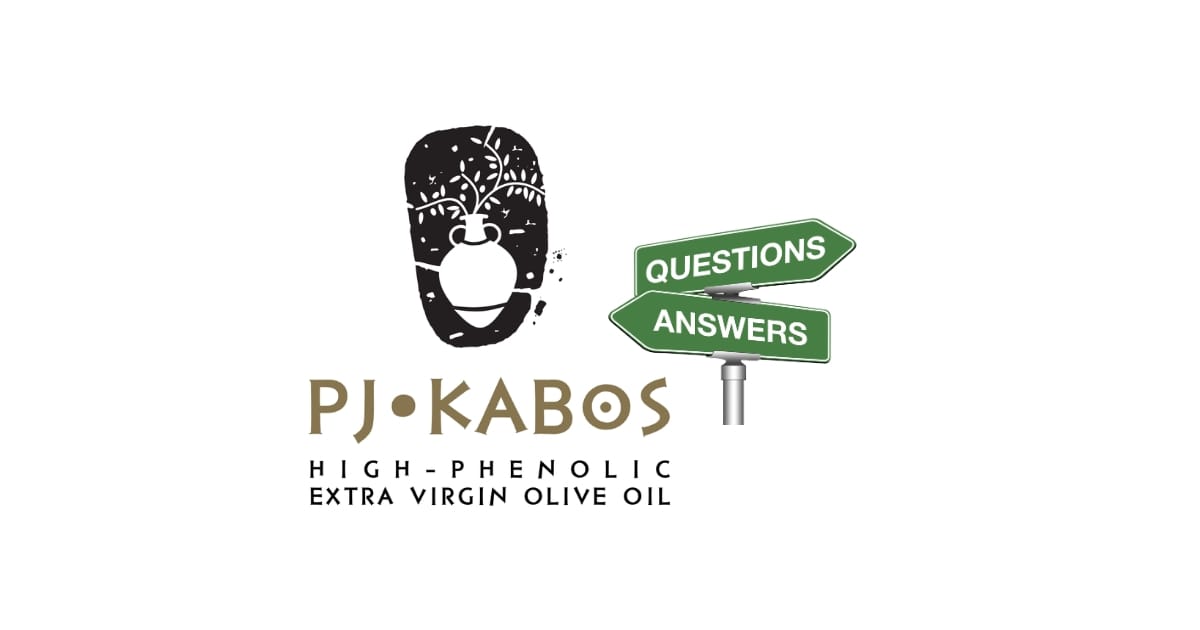You know olive oil is an extremely versatile cooking oil with loads of health benefits for humans—from improved heart and brain health to reduced inflammation to enhanced immunity—but did you know it can be super beneficial for pets, too?
Extra virgin olive oil is non-toxic when used both orally and topically with dogs and cats (and some other pets), and it has gained some popularity as a natural remedy in the holistic pet care world thanks to its abundance of beneficial fatty acids, polyphenols, and micronutrients.
And, while olive oil has not been as robustly studied in pets as it has in humans, some pet owners and veterinarians have seen the benefits first-hand—particularly for pesky pet conditions like dry skin and dandruff, matted fur, ear mites, and constipation.
Read on to learn how to safely incorporate EVOO into your pet’s routine. Keep in mind, if your pet is in distress or experiencing serious health issues, you should always contact your veterinarian!
Olive Oil For Dogs
Olive oil contains loads of dog-friendly nutrients such as monounsaturated fats and small amounts of omega-3s, which are great for dogs’ coats, and powerful polyphenols and vitamins that promote joint, brain, and heart health. Here are a few specific ways EVOO can benefit Fido. Just remember, it’s always a good idea to double check with your vet.
Dry Skin & Shedding
Many dogs suffer from flaky, dry skin. And while it can sometimes be a sign of something more serious like mange (which will require you to treat the underlying condition), it can often be chalked up to seasonal allergies or cold, dry air—especially in winter.
The good news: Any type of healthy fat can help moisturize and soothe the skin from the inside out. Not a ton of research has been done on olive oil for canine skin specifically, but veterinarians recommend it to help winterize your dog’s coat and prevent itching and flaking. Additionally, olive oil is rich in vitamin E and polyphenols, both of which can help reduce inflammation and protect skin against free radical damage. This means your dog will be less likely to scratch excessively, too, which can cut down on shedding. Olive oil may also help with canine atopic dermatitis (eczema), but more research is needed—right now, the best remedy for that seems to be omega-3 fish oil.
Pro tip: Don’t apply olive oil directly to your dog’s skin like a moisturizer, since this will likely cause them to lick and result in more irritation. Instead, add a small drizzle to your dog’s food.
Ear troubles
Your dog may be experiencing an ear infection, painful earwax buildup, or ear mites if you notice symptoms like ear scratching, head shaking, an unpleasant smell, or discharge coming from their ears. If not treated properly, these issues can become difficult to manage, so make an appointment with your vet ASAP to identify the underlying cause.
If your appointment is delayed, however, olive oil may offer some momentary relief. Olive oil has long been used to help remove earwax buildup and alleviate the pain of ear infections in humans, and it may soothe pups’ ears, too. EVOO is unlikely to irritate ears and it’s chock full of antimicrobial and anti-inflammatory compounds, including hydroxytyrosol. Olive oil may also help dislodge earwax and smother and asphyxiate ear mites. It’s not the best long-term strategy, however, since oil may actually promote yeast growth in ears over time.
To try it: Have your dog lie down on their side, open their ear flap, and carefully place a few drops of EVOO into the round opening of the ear canal from a dropper bottle (the olive oil should be slightly warm, but not hot). Gently massage the base of the ear from the outside to work in the olive oil for 30-60 seconds. When you’re done, allow your dog to shake their head, then after about 5 minutes, wipe away any debris that’s come out with a cotton ball.
Constipation
Recent research on adult humans suggests that olive oil has a subtle laxative effect and boosts the frequency of bowel movements—which is great if you’re constipated. The same seems to be true for dogs, too. Why? Fat seems to stimulate the “gastrocolic reflex,” which increases colon motility, which in turn stimulates bowel movements. Oil also lubricates the intestines, making it easier for stool to pass through. Just use sparingly, since too much fat can cause diarrhea.
Keep in mind, the causes of constipation in dogs can vary in their severity and include reduced activity levels, dehydration, old age, diet change, a serious internal blockage, or another underlying medical issue—so you never want to ignore it. Call your vet if your dog hasn’t had a bowel movement in 24-48 hours, or if they are in distress.
According to the American Kennel Club, other possible constipation remedies for pups include canned pumpkin, hydration, exercise, wet dog food, and fiber supplements.
How Much Olive Oil Should I Give To My Dog?
A little olive oil goes a long way. According to Deva Khalsa, VMD, a veterinarian and author of Natural Dog: A Holistic Guide for Healthier Dogs: For general health, “simply add olive oil to your dog’s food, use a teaspoon a day for a 30 to 40 lb dog, or up to a tablespoon for a large 90 lb dog.” This falls in line with other veterinarian recommendations calling for giving dogs no more than 1 teaspoon of olive oil per 20 pounds of body weight per meal.
Olive Oil For Cats
The MUFAs, polyphenols, and other nutrients in EVOO that are so beneficial for dogs may boost your cat’s health, too—offering benefits for skin, digestion, ears, and even matted fur and hair balls! But cats will need much less due to their smaller size. Here are a few specific ways EVOO can benefit your cat. Just remember, you may want to double check with your vet.
Dry Skin & Matted Fur
A small amount of olive oil may be added to your cat’s food a few times a week to moisturize skin and combat irritation and inflammation from the inside out—thanks to anti-inflammatory fatty acids, polyphenols, and skin-supporting vitamin E.
However, many cat owners absolutely swear by using olive oil topically on cats. Not to combat dry skin, but to remove pesky matted fur! To do this, use a syringe (the non-needle kind) to apply olive oil to the base of the matt as close to the skin as possible, gently rub it in, and then—poof!—a few days later, the mat just falls off. Re-apply more olive oil after about three days if it doesn’t work. Cover your furniture with towels if you’re worried about staining.
Constipation
Olive oil can promote motility and stimulate bowel movements in cats in the same way it does with dogs—by stimulating the gastrocolic reflex and making it easier for stool to pass through the intestines. Some cats are quite picky, though, and you never want to force them to consume olive oil. Tuna packed in olive oil can be a great way to get your cat to eat it voluntarily.
Keep in mind, cat constipation can be caused by diet change, dehydration, bowel obstructions, or any number of underlying conditions, including kidney disease—so you don’t want to ignore it. According to the Cornell University College of Veterinary Medicine, cats typically have a bowel movement 1-3 times a day, and you should call your vet if your cat hasn’t had a bowel movement in more than 24-48 hours, or if they are in distress.
Hairballs
Hairballs, a.k.a. the tube-shaped regurgitated cat fur that ends up all over your house, are a result of cats’ incessant need to groom themselves—and they’re pretty gross. Plus, the process of hacking them up isn’t the most pleasant for your cat. The good news: Adding about 1 teaspoon of olive oil to your cat’s food once a week can lubricate the digestive system and may help hairballs pass out the other end with ease. High-fiber canned pumpkin is another great way to keep your cat’s digestion regular and allow hairballs to pass easily.
Ear Mites
If your cat is scratching their ears or shaking their head much more than usual, and you notice a dark discharge from the ears, they could have ear mites. Ear mites are tiny parasitic arthropods (basically microscopic spiders) that are quite common in cats, and can occur in dogs as well. They feed off of wax and oils in the ears and cause loads of irritation. An animal typically gets ear mites after exposure to another animal with the mites.
If not treated properly, ear mites can also contribute to outer and inner ear infections that may cause serious damage to your cat’s eardrum if left untreated—so if you do suspect mites, contact your vet ASAP. But if your appointment is delayed, olive oil may offer some momentary relief by soothing ears and helping smother and asphyxiate ear mites. It’s not the best long-term strategy, however, since oil may promote yeast growth in ears over time.
To try it: Place your cat in your lap (swaddled in a towel, if you can manage it!), place a drop or two of EVOO into the round opening of the ear canal from a dropper bottle (the oil should be slightly warm, but not hot), gently massage the base of the ear to work in the oil for 30-60 seconds. Allow your cat to shake their head, then after about 5 minutes, wipe away any debris that’s come out with a cotton ball.
How Much Olive Oil Should I Give My Cat?
Recommendations for how much olive oil to give cats are somewhat hard to come by. The generally accepted amount that’s appropriate for hairball prevention is 1 teaspoon of olive oil over your cat’s food once a week. If you’re tempted to do more, check with your vet first.
Olive Oil For Other Animals
The benefits of olive oil may apply to other animals as well. Anecdotal accounts suggest that very small amounts of olive oil (i.e. a couple drops on their food) may help alleviate constipation in rabbits and rodents like hamsters, gerbils, guinea pigs, and mice.
Larger animals like horses may benefit, too. According to veterinary nutritionist Juliet M. Getty, PhD, culinary oils, including olive oil, may be mixed in with a horse’s grain to add extra calories to the diet during periods of heavy training. However, not all horses enjoy the taste of olive oil. Consult with your veterinarian or a veterinary nutritionist to determine the appropriate amount.
Bottom line
Olive oil certainly has some promising uses for pets of all sizes—from promoting a shiny coat to battling constipation. But just remember, whether your pet is dealing with flaky skin, constipation, or itchy ears, there may be a serious underlying condition at play that olive oil alone won’t solve. So, in addition to considering the natural olive oil remedies above, be sure to call your veterinarian for further guidance. You’ll never be sorry that you double checked!
Product placement
PJ KABOS 'Family Reserve Organic - Medium'
High Phenolic and 2022 Gold-Award Winner.
Declared as 'One of the World's Best Olive Oils'.
Click here to shop.





